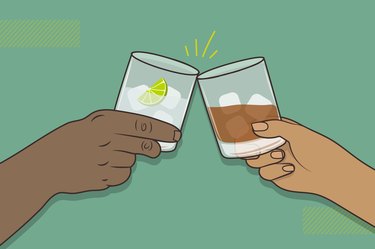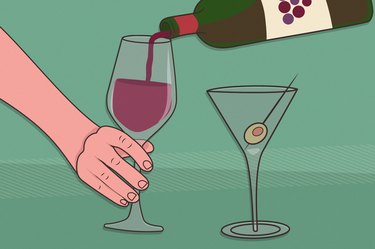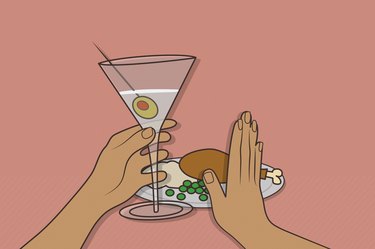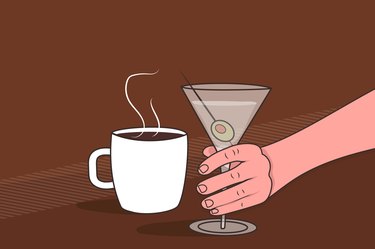
Will brown liquor actually make you sicker? Here, we explore the dark side of dusky-hued alcohol to discover if ordering a screwdriver is a healthier choice than a whiskey sour — plus, which will leave you feeling crappier the next morning.
Which Liquors Are Considered Clear Versus Dark?
Clear Liquors
- Vodka
- Gin
- Silver tequila
- Light or Silver Rum
Dark Liquors
- Brandy
- Whiskey (including Bourbon and Scotch)
- Cognac
- Gold tequila
- Dark or Gold Rum
Video of the Day
How Does Dark Liquor Get Its Color?
All hard alcohol starts out clear. But dark varieties are aged in wooden barrels. Over time, the wood color leaches into the beverage and tints it. (Fun fact: Moonshine is unaged whiskey, which is why it's clear instead of tawny.)
Video of the Day
The majority of dark alcohol also contains artificial caramel coloring to give it a richer hue. Liquor can contain a max of 2.5 percent food coloring, according to the Alcohol and Tobacco Tax and Trade Bureau.
What Are Congeners?
Congeners are toxic byproducts created during the fermentation process. Congeners also contribute to the flavor and shade of an alcoholic beverage, per an older January 2008 study in Alcohol and Alcoholism.
"The longer liquor is aged, the more congeners are created," says Lauren Popeck, RD, a registered dietitian at Orlando Health.
Because dark booze has spent more time fermenting, it typically contains a greater number of congeners than pale spirits. (The exception is tequila, which has high levels of congeners even when clear in color, according to Orlando Health.)
And by the way, this rule of thumb holds true for any kind of alcoholic beverage — not just hard liquor. Red wine and dark beer typically have more congeners than white wine and light beer, per the January 2008 Alcohol and Alcoholism study.
Now let's dig a little deeper into what types of contaminants a glass of whiskey may contain. According to an older May 2009 study in Alcoholism: Clinical & Experimental Research, common congeners include:
- Acetone (a solvent used in nail polish remover and paint remover)
- Methanol (a poisonous substance that breaks down into formaldehyde and formic acid)
- Acetaldehyde (a potentially cancer-causing chemical that some people are particularly intolerant to, per the Centers for Disease Control and Prevention)
In this study, researchers compared the effects of a night spent drinking vodka versus bourbon, which contains 37 times the amount of congeners as vodka. While both groups slept equally poorly and were less alert the next day, the Wild Turkey imbibers reported significantly more intense hangover symptoms than those who'd sipped Absolut.
In other words, even though everyone was measured with similar deficiencies in shut-eye and cognitive function, bourbon drinkers ended up subjectively feeling worse.
"Because congeners are toxic, our bodies don't tolerate them well," Popeck says. "Drinking alcohol with high congener levels can lead to side effects including headache, nausea and dizziness."
Does Dark Liquor Contain More Antioxidants?
Just so we're, ahem, clear: If you want to get more antioxidants, booze is not the answer. In fact, drinking alcohol has the opposite effect: It contributes to oxidative stress, which in turn can cause cellular damage, according to a July 2022 systematic review in the journal Antioxidants.
That said, dark liquor does have a greater quantity of antioxidants than its light-colored counterpart. A January 2020 study in the Annals of Chemistry found that dark alcohol — including brandy, whiskey and cognac — contained antioxidants while vodka did not. (The study did not look at rum, tequila or gin.)
A February 2012 study in the Croatian Journal of Food Science and Technology suggests that this might be a result of antioxidants leaching into the liquor from the wood barrels it's aged in. Still, the antioxidant count is minimal: A serving of brandy has between 15 to 48 milligrams of antioxidant polyphenols whereas a serving of black or green tea clocks in at 225 milligrams.
The bottom line: "The harm caused by drinking outweighs the benefit of ingesting any antioxidants the alcohol may contain," Popeck says.
Does Dark Liquor Have More Allergens?
You might be likelier to have an allergic reaction to brown bevvies. "Clear liquors are more filtered, which might help reduce allergenic substances," Popeck says. "In addition, some people might be sensitive to the food coloring in dark alcohol."
Symptoms of alcohol allergies include nausea or cramping, a rash, itching and swelling after drinking, according to the Cleveland Clinic. Keeping a food diary listing what you drink and how you feel afterward can help you piece together whether or not you have a sensitivity.
Good to know: Drinks concocted with premium liquors also tend to be more distilled than well drinks — and as a result, they may contain fewer allergens and congeners.
What Contributes to a Hangover?
While congeners can play a role in hangover symptoms, the primary determinant of whether or not you'll feel like hell in the morning is how much you imbibe.
The more you knock back, the greater your chances of experiencing a hangover. Drinking can lead to mild dehydration, poor sleep, irritation of the stomach lining, inflammation and minor withdrawal, according to the NIAAA.
"If you drink on an empty stomach, alcohol reaches your bloodstream quicker than if you have it with food, which can make you more hungover," Popeck says.
The rate at which you drink also matters. Sipping more slowly (aim for one drink max per hour) — and having a glass of water after every cocktail — can help prevent a hangover.
Related Reading
So, Is Drinking Dark Liquor Really That Bad for You?
"In my opinion, as long as you drink in moderation it is not that bad," Popeck says. "One glass of dark alcohol will not have a major effect, as long as you have it along with food and stay hydrated by drinking water."
But drinking more than the daily recommended amount of booze (two drinks max per day for people assigned male at birth; one drink per day for those assigned female at birth) is detrimental to your health, no matter what color your beverage is.
- Alcohol and Tobacco Tax and Trade Bureau: "CHAPTER 7 COLORING/FLAVORING/BLENDING MATERIALS"
- Alcohol and Alcoholism: " The alcohol hangover–a puzzling phenomenon "
- Alcoholism: Clinical & Experimental Research: "Intoxication with Bourbon versus Vodka: Effects on Hangover, Sleep and Next-Day Neurocognitive Performance in Young Adults"
- Centers for Disease Control: "3 Weird Things About Acetaldehyde"
- Swinburne University of Technology: " Alcohol congeners and their impact on hangover severity"
- NIAAA: "Medical Complications: Common Alcohol-Related Concerns"
- Annals of Chemistry: "Antioxidant Properties of Various Alcoholic Beverages: Application of a Semiempirical Equation"
- Croatian Journal of Food Science and Technology: "Spirit drinks: a source of dietary polyphenols"
- Cleveland Clinic: " Alcohol Intolerance "
- Orlando Health: "Congeners: How These Chemicals Contribute to How You Feel After Drinking"
- Antioxidants: "Alcohol-Induced Oxidative Stress and the Role of Antioxidants in Alcohol Use Disorder: A Systematic Review"



